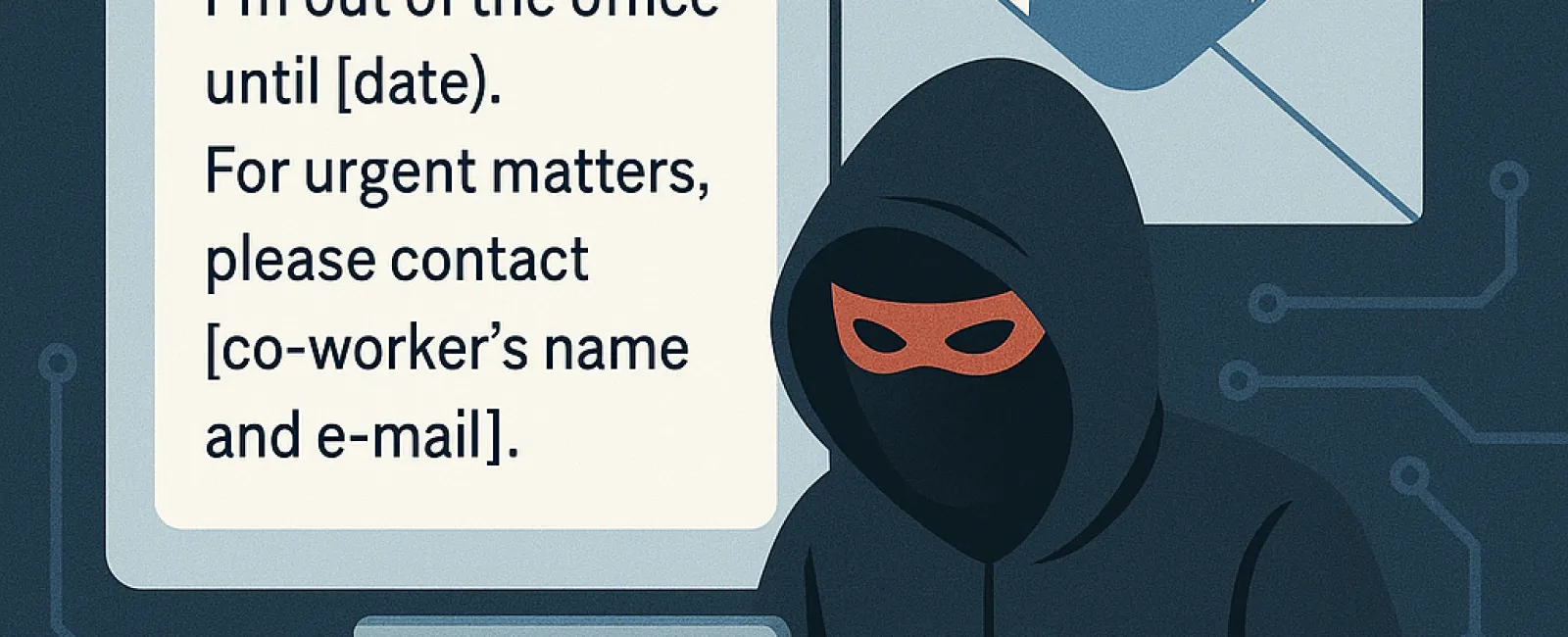June 16, 2025
Set your out-of-office message and relax, but beware: while you’re packing for your trip, your auto-reply starts broadcasting a tempting message to cybercriminals:
"Hello! I'm away from the office until [date]. For urgent matters, please reach out to [coworker's name and e-mail]."
It seems harmless and convenient, right?
But this is exactly what hackers are waiting for.
Your simple auto-reply, designed to keep communication smooth, actually hands cybercriminals valuable information to exploit.
Consider what a typical out-of-office message reveals:
● Your full name and job title
● Dates when you’re unavailable
● Alternate contacts with their email addresses
● Internal team details and structure
● Even the reason for your absence (e.g., "I'm attending a conference in Chicago…")
This information gives cybercriminals two powerful advantages:
1. Perfect Timing: They know exactly when you’re away and less likely to notice suspicious activity.
2. Precise Targeting: They identify who to impersonate and which contacts to deceive.
This sets the stage for devastating phishing or business email compromise (BEC) attacks.
How This Scam Unfolds
Step 1: Your auto-reply is triggered and sent.
Step 2: A hacker uses this info to impersonate you or your listed alternate contact.
Step 3: They send a fraudulent "urgent" request for wire transfers, passwords, or sensitive documents.
Step 4: Your coworker, unsuspecting, believes the request is genuine.
Step 5: You return from vacation to discover a costly unauthorized transaction, like $45,000 wired to a fake vendor.
This scenario is more common than you might expect and poses an even greater risk for companies with frequent travelers.
If your business has employees who travel often—especially executives or sales teams—and rely on assistants or admins to manage communications during their absence, it creates ideal conditions for cyberattacks:
● Admins handling emails from multiple people
● Responsible for processing payments, documents, or sensitive requests
● Working quickly and trusting the authenticity of emails they receive
Just one well-crafted fake email can slip through and lead to costly breaches or fraud incidents.
Protect Your Business From Auto-Reply Exploits
Rather than eliminating out-of-office replies, the key is to use them strategically and implement protective measures. Here’s how:
1. Keep Your Message Vague
Avoid sharing detailed plans or naming who’s covering for you unless absolutely necessary.
Example: "I'm currently out of the office and will respond when I return. For immediate help, please contact our main office at [main contact info]."
2. Educate Your Team
Ensure your staff understands:
● Never act on urgent financial or sensitive requests based solely on email
● Always verify unusual requests through a secondary channel, like a phone call
3. Deploy Advanced Email Security
Use robust email filters, anti-spoofing tools, and domain protection to block impersonation attempts before they reach your inbox.
4. Enforce Multifactor Authentication (MFA)
Activate MFA on all email accounts to prevent unauthorized access, even if passwords are compromised.
5. Partner With Proactive IT Security Experts
Work with IT professionals who monitor login attempts, detect phishing, and flag unusual activities before harm occurs.
Ready To Enjoy Your Vacation Without Cyber Risks?
We specialize in building cybersecurity defenses that keep your business safe—even when your team is out of office.
Click Here or Call Us At 714-579-3026 to schedule your FREE 15-Minute Discovery Call. We'll assess your vulnerabilities and guide you on securing your systems so you can truly relax on vacation without worrying about your inbox betraying you.





